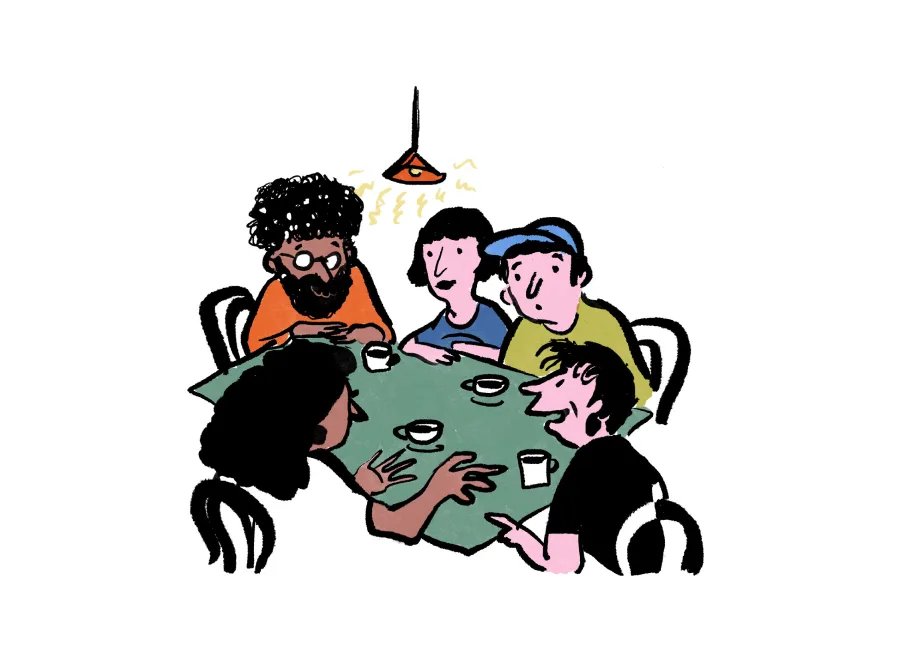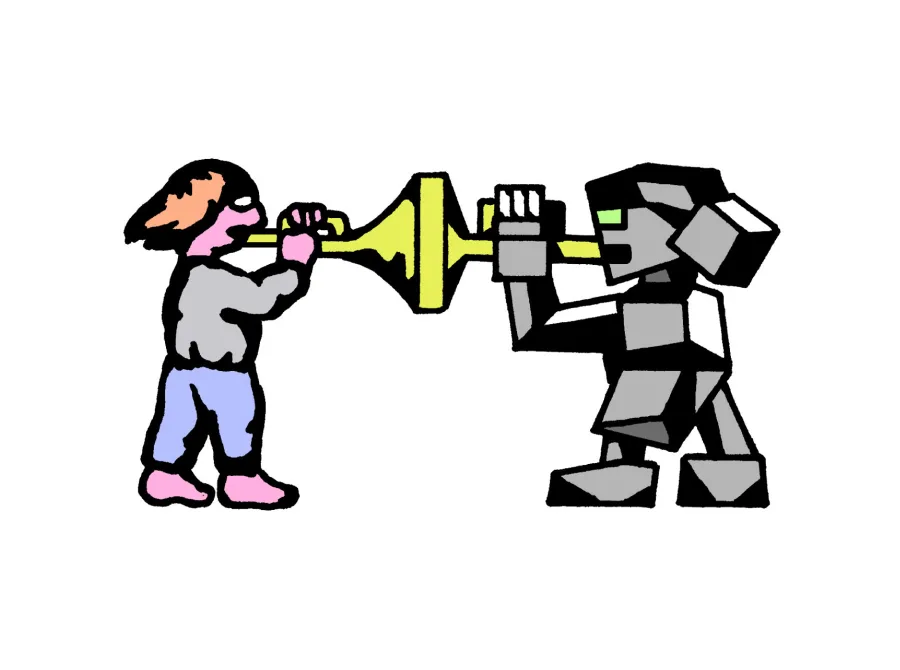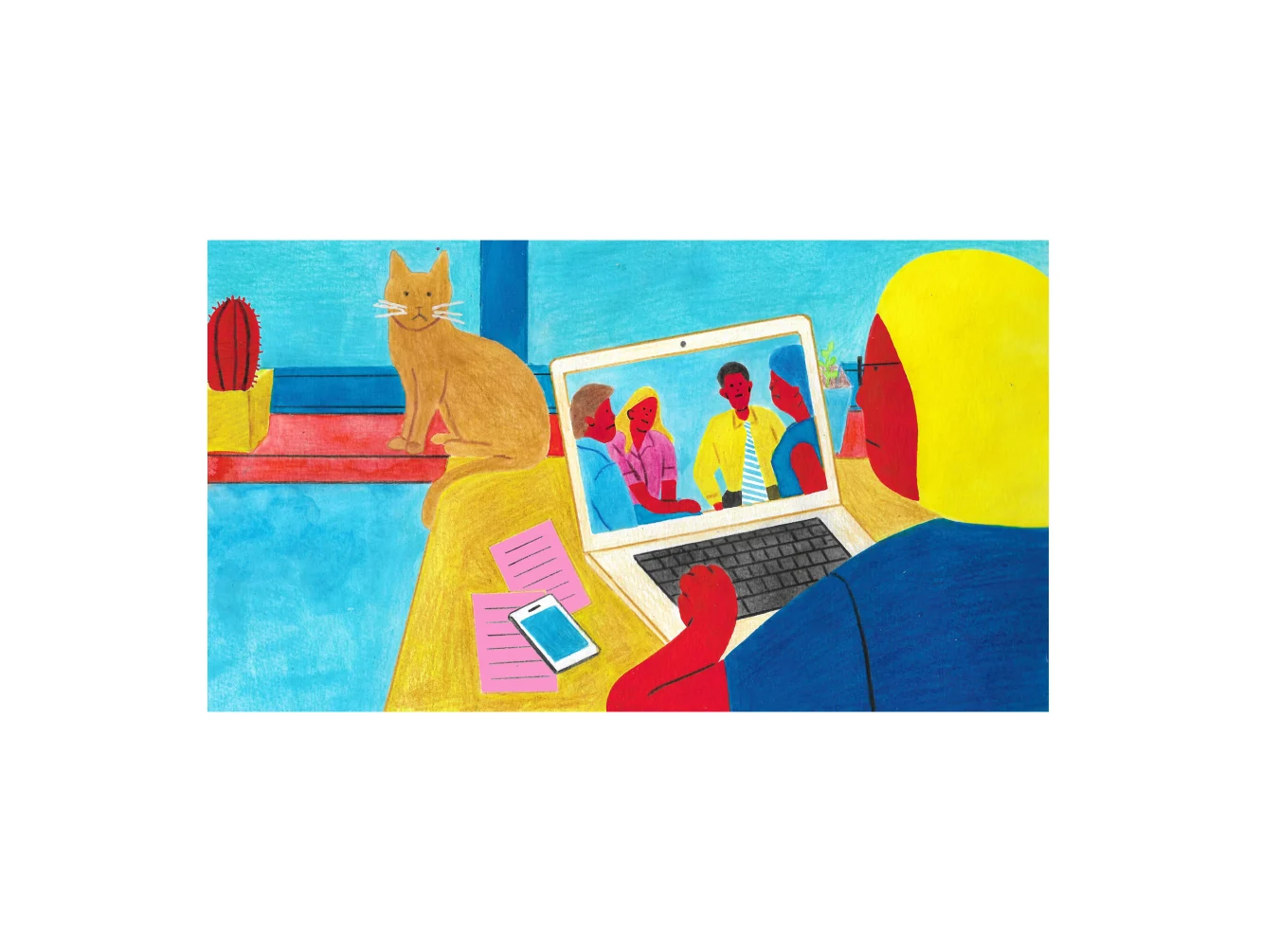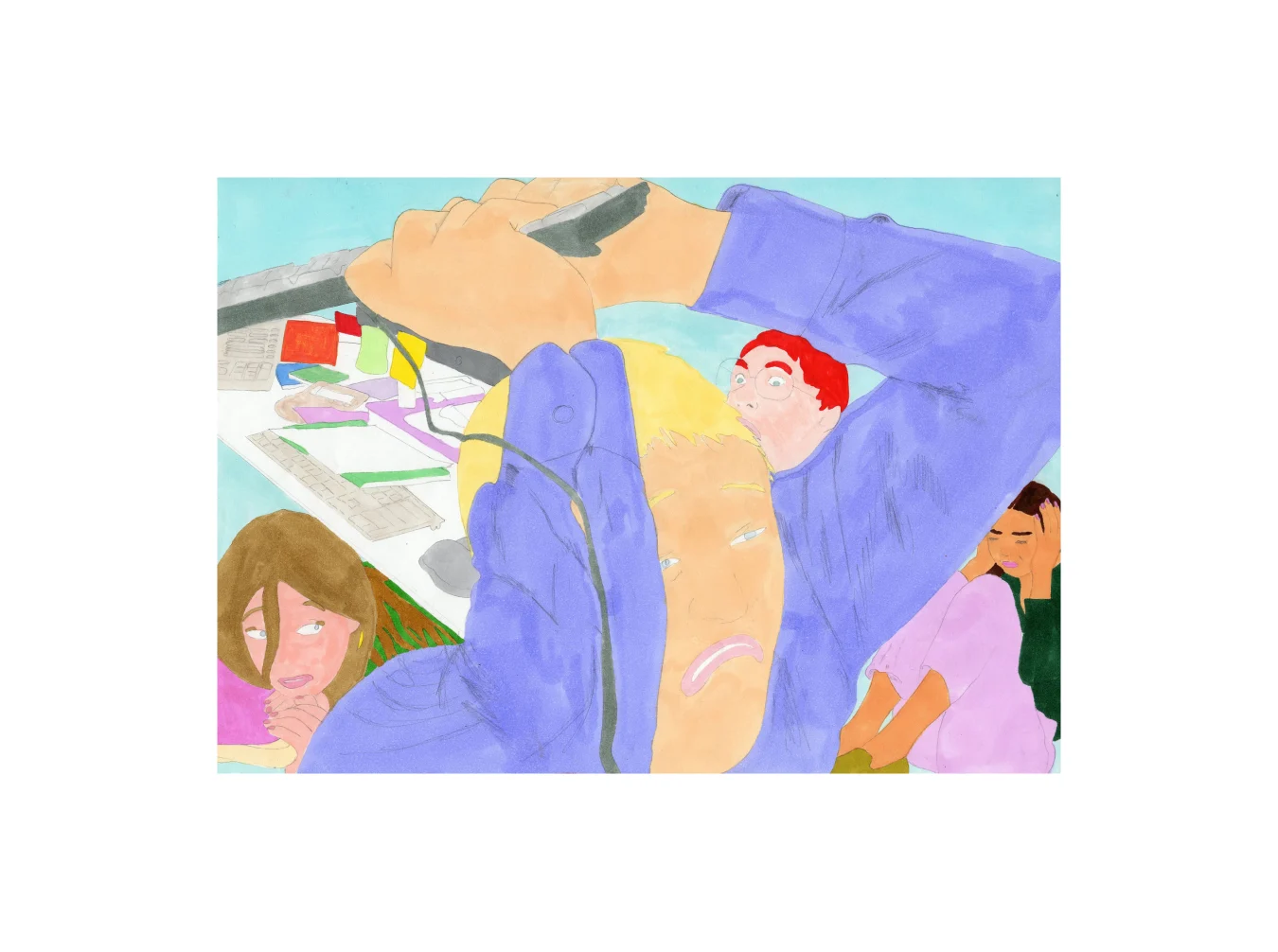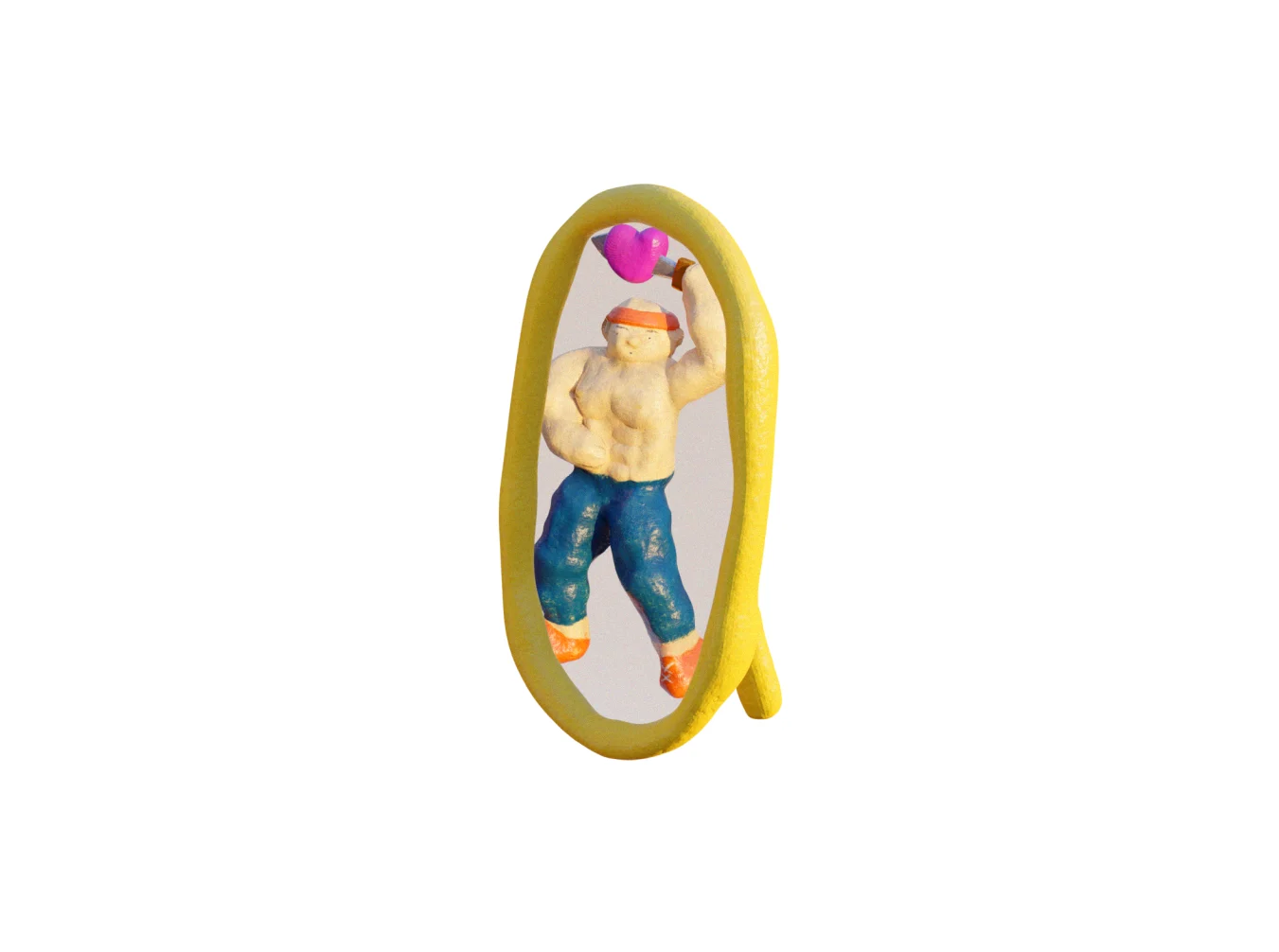

There are lots of things for creatives to think about beyond having good ideas. We’re here to help, with our advice series Stuff They Don’t Tell You. Here, James Cartwright looks at how, when and whether a freelancer should start their own company.
Illustrations by Sarah Mazzetti.
Working alone as a freelance creative can limit the scope and scale of your output. After all, one person can only work so many hours in a day, so many days in a week. While that’s unlikely to be a problem when you first start out, over time you may get the nagging feeling that you could be doing things differently.
Of course you can always contribute to large-scale projects as part of a team, but if your ambition is to maintain creative control of work that’s beyond your individual capabilities then perhaps you should think about starting your own business.
Jordan Stokes and Kevin King technically founded their creative agency, Goodness, in 2014, after the success of their charity project Secret 7”. But while Secret 7” has gone on to become an annual highlight of London’s creative calendar, it’s only recently that the pair decided to focus on making Goodness their full-time thing.
“We talked about it loads of times,” says Jordan. “We've gone round in circles, got frustrated, got all sorts of varying emotions. And then, all of a sudden the time was right for me to leave a job and it all came together, or is coming together.”
Despite everything, running a small business can be enormously rewarding.
While Jordan and Kevin are only just starting out, Danielle Pender, founder and editor of Riposte magazine and studio, has been reaping the rewards of running her own business for a few years. “The best thing is being able to decide who I work with and what we do,” she says. “I don’t have to make work for some Turkish drinks brand just because the company says I have to. I don’t have to sit and do a project that I don’t give a fuck about for months at a time.”
There are downsides of course. “Literally anything to do with money is the worst,” says Danielle. “I’ve become a pro at VAT and corporation tax stuff but you just have to understand all that to survive.”
Isabel Gibson and Helen Chesner of installation and spatial design studio Isabel + Helen agree. “Just running the studio can sometimes take over. All the admin that goes hand in hand with running a business is huge, like the managing of projects and budgets. There’s still so much that we’re learning, and we definitely spend more time on Excel spreadsheets than we’d like.”
But despite all this, running a small business can be enormously rewarding. There are, of course, some things which are good to know before you give it a go…

Learn from other people first
Danielle spent nearly 10 years working for ad agency Kessels Kramer before she made Riposte her full-time job; Isabel and Helen have both spent time in-house at different agencies; Kevin has worked in both the music and advertising industries, and Jordan was the creative director of a branding agency in Sydney before joining Kevin to run Goodness full-time. While it’s certainly not impossible to run your own business without any experience, it’s a hell of a lot less risky to get some decent experience before you do.
“We would highly recommend working in other studios and gaining experience,” say Isabel and Helen. “This way you can really be sure what it is you want to specialize in. It’s always good to build up a couple of clients before taking the plunge!”
Make sure you can work with your business partner
Shared goals alone don’t lead to a good working relationship. Running a business with another person means a lot of time spent side by side, through good times and bad. Very much like a marriage.
“I’ve always said that Jord and I have a telepathic way of working together,” says Kevin. “We often think along the same lines, and then, when we build on each other’s ideas it feels right, and neither of us gets pissed off about what the other one is doing. We’re aligned on everything, there’s a lot of trust and I know I can't really do this without him.”
“Trust is a big thing,” agrees Jordan. “We both have complete respect for the other’s input”

Work out who you are
Being clear about who you are and what you stand for makes attracting clients much more straightforward.
When you’re a sole trader working for yourself, your unique selling point is you – who you are and the work you do. Once you’ve started a business, all that changes. What is your business? What services does it offer? How do you stand out in a crowded marketplace? What are your values? How do you define those values and objectives to your clients?
“If we were on our own, then we wouldn’t be on the same path, but the exciting bit is making a new thing out of our collaboration,” Jordan says. “But that does make it a bit more tricky to work out what our final vision is.”
Being clear about who you are and what you stand for makes the process of attracting clients and collaborators that much more straightforward.
Think about structure
Building a full-time team might make you feel more professional, but from a financial point of view, it could be a complete disaster. In order to pay salaries you need to have enough work, but in order to execute that work you may need to hire people. Hiring people means HR, which can be costly and time-consuming. That’s where your freelance network can come in handy.
“I’m still the only person that’s full-time and takes a salary from Riposte,” says Danielle. “Everyone else is paid on a project-by-project basis and they all work for other people too. It’s not ideal, but it means we can keep it flexible, not have too many overheads and make more ethical decisions about who we do and don’t want to work with. But we do want to grow and have more people working full-time in the future.”

Define success for yourself
If you’ve started your own business to do things differently from your past employers then defining what success looks like will help you stay focussed on your real goals.
“I left Universal because I was frustrated that I wasn't getting anything done that wasn’t ruined by bureaucracy and business,” says Kevin. “So now if we can do the work we want, see more of our families, have the flexibility to work when and where we like, then that’s our idea of success.”
Danielle agrees. “It’s easy to think that success is a bright, airy studio in an expensive part of town with loads of employees, but if you’re doing that then you can very easily compromise your work. We’ve had people wanting to invest in Riposte and grow it, but it’s about whether that means we can keep doing what we’re doing or if we’ll have to make a load of fucking clickbait to grow the numbers and get more advertising.”
Accept the fuckups
Things will go wrong, and that’s going to be your responsibility. You run the company and all the decisions the company makes are down to you. For a while, that’s probably going to cause some sleepless nights. And then it won’t.
“I just don’t get stressed about it anymore,” says Danielle. “If people are shit to work with then you don’t work with them again. If a client pulls out of a project last minute, then fine. If the printer fucks something up then fuck it, I don’t care.”
“Lots of things don’t turn out the way you expect them too,” agree Isabel and Helen, “no matter how much preparation and planning goes into them. It's about how you react to the problems and how quickly you find solutions or compromises. We once had a whole installation blow away off the roof of a well-known members club in Shoreditch. It’s quite hard to rectify something like that…”

You won’t always get what you want
Some of the work you do will be epic, but some will just be okay. And that’s fine.
So you’ve made a lot of big decisions to set up your own business and invested a lot of time and money into making it work. In an ideal world you’d just sit back and watch the dream clients roll in. Some of the work you do will be epic, but some will just be okay. And that’s fine.
“We’ve had some great opportunities to make work that we feel truly passionate and excited about, mixed with some less creatively-led projects that we do as a studio to pay the bills,” say Isabel and Helen. “These jobs are still really useful to do and we wouldn’t be able to do the good stuff without them. It is great when you have a balance of the two.”
“You just have to find a level of operating where you don’t get too excited about the good stuff and you don’t get too stressed about the tough stuff, because otherwise you’d be an emotional wreck all the time,” says Danielle.
Do your reading
Do you know your LLP from your PLC, or the difference between a business partnership and a social enterprise? Depending on what your company does and how many people it employs there will be different taxes, costs and obligations to your employees that you will need to take into account.
It’s not sexy, it’s not glamorous and it’s not why you got into this business. But my goodness it’s important!





